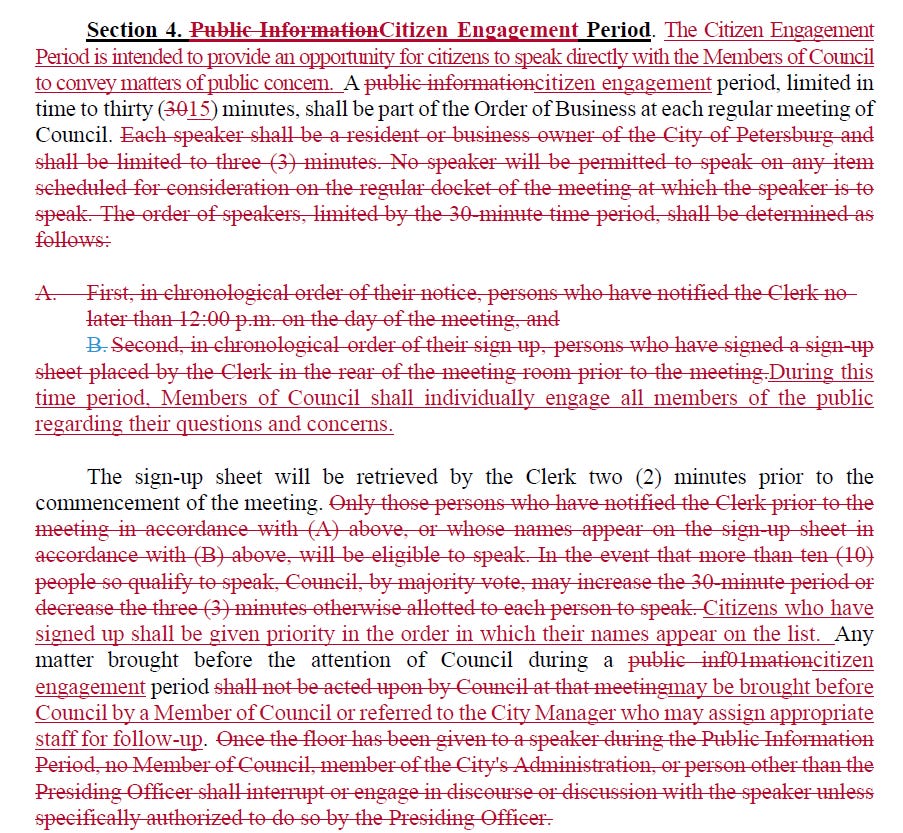Petersburg Council Poised to Gut Public Participation Tomorrow
The agenda for Petersburg Council's Organizational Meeting suggests troubling attacks on public participation and transparency.
Tomorrow afternoon, Petersburg City Council will hold an Organizational Meeting where they plan to adopt a new version of the Rules of the City of Petersburg Council. These rules are nearly identical to those that previously governed the Council, except for a handful of changes that represent a direct attack on public participation and transparency.
Petersburg provides Council meeting agendas and agenda packets on the City’s website; here we’re considering the agenda packet for tomorrow’s Organizational Meeting.
Proposed Rules Changes
The first proposed rules change shows up on page four of the Resolution to Amend and Re-Adopt the Rules of Council. It removes the opportunity for the public to be heard on resolutions considered by Council and removes procedural language about public commentary.
The next proposed change appears on page five, and it totally eliminates public comments from Council work sessions.
More extensive proposed rules changes appear on page eight, changes that concern regular Council meetings and represent a further affront to public participation. The proposed, freshly branded “Citizen Engagement Period,” will last a mere 15 minutes as opposed to the previous 30 minutes allotted.
Instead of public speakers addressing the Council formally and on the record, members of Council will now “individually engage all members of the public regarding their questions and concerns.” It’s not clear what that means.
The prohibition against members of Council or the Administration interrupting public speakers has also been removed.
Finally, there’s a proposed new rule regarding the use of city-issued email accounts for city business. The requirement of Council members to use the official city email addresses for “communications concerning matters of City business” is a fine rule and, based on what I know about this particular Council, perhaps even necessary.
But the affirmative claim that “[a]ny email communications sent by a Member of Council from email addresses other than the assigned City email address shall be considered to be a personal communication and presumed not pertaining to the official business of the City of Petersburg” is problematic.
For example: last June I sent a FOIA request seeking communications “including to/from personal email accounts and text messaging applications” between Petersburg Councilman W. Howard Myers and Del. Kim Taylor (R-Dinwiddie) as well as former state Sens. Joseph Morrissey (D-Richmond) and Rosalyn Dance (D-Petersburg).
Based on the language of the proposed rule - instead of asking the Councilman to actively search his personal email and messaging accounts for public records responsive to my request - Petersburg’s FOIA Office may instead presume those records are “personal” and “not pertaining to” official City business, regardless of the actual nature of the records.
Further Devolution of Open Government in Petersburg
You could devote an entire book to the inability of Petersburg officials to simply accept, much less facilitate, basic public participation and transparency in government. Check out, for example, the documents available from the ACLU of Virginia regarding Christian v. City of Petersburg and W. Howard Myers:
“The ACLU of Virginia filed a federal lawsuit against the City of Petersburg and the Mayor, W. Howard Myers for violating the First Amendment rights of a local resident and activist, Mr. Linwood Christian, who was prohibited from speaking at a city council meeting on January 20, 2015 solely because he owed an unpaid fine to the City. The City may not impose unreasonable restrictions on the free speech rights of its residents to speak during the public comment portion of a government meeting…
On Nov. 23, the City of Petersburg and Mr. Christian reached a settlement agreement in which the city would pay $3,000 to the ACLU of Virginia to cover its costs of representing Mr. Christian. The city also agreed to release a public statement about the case, which can be found in the settlement agreement below.”
The year following that settlement, the ACLU of Virginia had to once again address the Council. According to Katy Evans’ reporting in the Richmond Times-Dispatch at the time, then ACLU of Virginia Executive Director Claire Guthrie Gastañaga said in a letter to Council:
“Holding meetings at inconvenient times and in small spaces that cannot accommodate the public violates the spirit of open government laws that serve to promote an increased awareness by all persons of government activities and afford every opportunity to citizens to witness the operations of government.”
Without recounting the opaque saga through which Petersburg cut their casino deal, a saga during which the Council embarrassed multiple members of the General Assembly, we could see tomorrow’s proposed rules changes as a continuation of the behavior of this Council.
And if members of the General Assembly were too weak to stop them on the casino front, there isn’t much room for faith in anyone else’s ability to stop them tomorrow.







